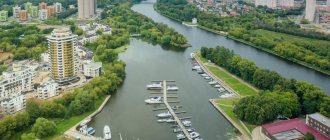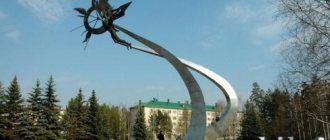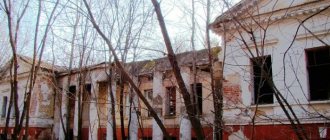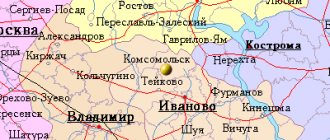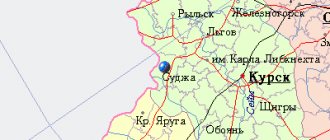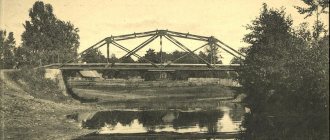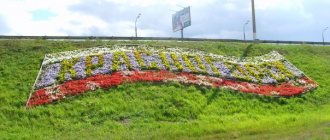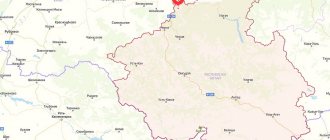This term has other meanings, see Aprelevka (meanings).
| City Aprelevka Flag | Coat of arms |
| A country | Russia, Russia |
| Subject of the federation | Moscow regionMoscow region |
| Municipal district | Naro-Fominsk |
| urban settlement | Aprelevka |
| Coordinates | 55°32′00″ n. w. 37°03′00″ E. long / 55.53333° north w. 37.05000° E. d. / 55.53333; 37.05000 (G) [www.openstreetmap.org/?mlat=55.53333&mlon=37.05000&zoom=12 (O)] (Z)Coordinates: 55°32′00″ N. w. 37°03′00″ E. long / 55.53333° north w. 37.05000° E. d. / 55.53333; 37.05000 (G) [www.openstreetmap.org/?mlat=55.53333&mlon=37.05000&zoom=12 (O)] (I) |
| Chapter | Tamarkin Vitaly Alekseevich |
| Based | 1899 |
| City with | 1961 |
| Square | 29 [1][not in the source ]K:Wikipedia:Articles without sources (type: not specified) km² |
| Center height | 190 |
| Population | ↗25,205[2] people (2016) |
| Names of residents | Aprilevtsy, Aprilevets, Aprilevchanka |
| Timezone | UTC+3 |
| Telephone code | +7 496 345 |
| Postal codes | 143360, 143362, 143363, 143369 |
| Vehicle code | 50, 90, 150, 190, 750 |
| OKATO code | [classif.spb.ru/classificators/view/okt.php?st=A&kr=1&kod=46238502 46 238 502] |
| Official site | [www.aprelevka.rf elevka.rf] |
| Aprelevka |
| Moscow Naro-Fominsk Aprelevka |
| Naro-Fominsk Aprelevka |
K: Settlements founded in 1899
Aprelevka
- a city in Russia (since 1961) in the Naro-Fominsk district of the Moscow region [3]; the largest settlement of the municipal formation "urban settlement of Aprelevka"
The population of the city is 25,205[2] people. (2016).
Aprelevka is located on the banks of the Desna River[3], 42 km southwest of the city of Moscow and 28 km northeast of the city of Naro-Fominsk[4]. Railway station on the Moscow - Kaluga line of the Moscow Railway.
Content
- 1. History
- 2 Population
- 3 Economics
- 4 Transport 4.1 Railway
- 4.2 Buses
- 4.3 Cars
- 5.1 Demidov estate
- 8.1 Video
Population[ | ]
| Population | |||||
| 2006[8] | 2007[9] | 2008[10] | 2009[11] | 2010[12] | 2011[10] |
| 20 044 | ↘18 679 | ↘18 497 | ↗19 017 | ↗19 154 | ↗20 855 |
| 2012[13] | 2013[14] | 2014[15] | 2015[16] | 2016[17] | 2017[18] |
| →20 855 | ↗22 162 | ↗23 872 | ↗25 092 | ↗26 373 | ↗27 773 |
Story
On September 27, 1899, the Aprelevka station of the Moscow-Kiev-Voronezh Railway was opened. The name of the station was given by the Aprelevka estate, which belonged to the writer Nikolai Nikolaevich Zlatovratsky (1845-1911), and the estate, in turn, was named after the Aprelevka river. The river has been on the map since 1850. In the past, the river was called Oprelovka, Aprelovka, the name is associated with the word “ripe”[5].
In 1899, landowner O. S. Dubovich founded a brick factory. In 1910, German industrialists Gottlieb (Bogdan) Moll, Albert Vogt and August Kibert built a factory for the production of gramophone records, Metropol-Record. In 1918, the factory was nationalized and renamed Aprelevsky.
In 1935, Aprelevka was given the status of a workers' village. In 1961, Aprelevka became a city of regional subordination[6].
In 2004, the village of Mamyri and the village of Frunzevets were included in the city[7].
In 2005, in connection with the reform of local government, the city of Aprelevka became the center of the municipal formation “Urban Settlement Aprelevka”[8].
Notes
- Home::Federal State Statistics Service
- ↑ 1 2 3
Estimation of the permanent population of the Moscow region as of January 1, 2022 and on average for 2022 for municipalities
(unspecified)
. Mosoblaststat. Access date: April 20, 2022. - ↑ 12
Great Russian Encyclopedia: In 30 volumes / Chairman of scientific editor. Council Yu. S. Osipov. Rep. edited by S. L. Kravets. T. 2. Ankylosis - Bank. - M.: Great Russian Encyclopedia, 2005. - 766 p.: ill.: map. - Distance between cities (unspecified)
(inaccessible link). WhoYOUgle is a universal reference book. Retrieved May 13, 2015. Archived September 26, 2022. - Smolitskaya G.P.
Toponymic dictionary of Central Russia: Geographical names. - M.: Armada-press, 2002. - S. . — 416 p. — ISBN 5-309-00257-X. - THE USSR. Administrative-territorial division of the union republics on January 1, 1980 / Comp. V. A. Dudarev, N. A. Evseeva. - M.: Izvestia, 1980. - 702 p. — P. 174.
- Resolution of the Governor of the Moscow Region dated July 22, 2004 No. 145-PG “On the unification of some settlements of the Naro-Fominsk District of the Moscow Region” (undefined)
(inaccessible link -
history
). - Law of the Moscow Region dated February 28, 2005 No. 72/2005-OZ “On the status and boundaries of the Naro-Fominsk municipal district and newly formed municipalities within it” (undefined)
(doc). Archived from the original on December 30, 2008., [1] (inaccessible link) - ↑ 123456789
People's encyclopedia "My City". Aprelevka - All-Union Population Census of 1939. The size of the urban population of the USSR by urban settlements and intra-city areas (unspecified)
. Retrieved November 30, 2013. Archived November 30, 2013. - All-Union Population Census of 1959. The size of the urban population of the RSFSR, its territorial units, urban settlements and urban areas by gender (Russian). Demoscope Weekly. Access date: September 25, 2013. Archived April 28, 2013.
- All-Union Population Census of 1970 The size of the urban population of the RSFSR, its territorial units, urban settlements and urban areas by gender. (Russian). Demoscope Weekly. Access date: September 25, 2013. Archived April 28, 2013.
- All-Union Population Census of 1979 The size of the urban population of the RSFSR, its territorial units, urban settlements and urban areas by gender. (Russian). Demoscope Weekly. Access date: September 25, 2013. Archived April 28, 2013.
- All-Union population census of 1989. Urban population (undefined)
. Archived from the original on August 22, 2011. - All-Russian population census 2002. Volume. 1, table 4. Population of Russia, federal districts, constituent entities of the Russian Federation, districts, urban settlements, rural settlements - regional centers and rural settlements with a population of 3 thousand or more (unspecified)
. Archived from the original on February 3, 2012. - Alphabetical list of settlements in municipal districts of the Moscow region as of January 1, 2006 (unspecified)
(RTF+ZIP). Development of local self-government in the Moscow region. Access date: February 4, 2013. Archived January 11, 2012. - The size of the permanent population of the Russian Federation by cities, urban settlements and regions as of January 1, 2009 (unspecified)
. Retrieved January 2, 2014. Archived January 2, 2014. - Population census 2010. Population of Russia, federal districts, constituent entities of the Russian Federation, city districts, municipal districts, urban and rural settlements (Russian). Federal State Statistics Service. Access date: January 21, 2013. Archived April 28, 2013.
- Population of the Russian Federation by municipalities. Table 35. Estimated resident population as of January 1, 2012 (unspecified)
. Retrieved May 31, 2014. Archived May 31, 2014. - Population of the Russian Federation by municipalities as of January 1, 2013. - M.: Federal State Statistics Service Rosstat, 2013. - 528 p. (Table 33. Population of urban districts, municipal districts, urban and rural settlements, urban settlements, rural settlements) (undefined)
. Retrieved November 16, 2013. Archived November 16, 2013. - Table 33. Population of the Russian Federation by municipalities as of January 1, 2014 (unspecified)
. Access date: August 2, 2014. Archived August 2, 2014. - Population of the Russian Federation by municipalities as of January 1, 2015 (unspecified)
. Access date: August 6, 2015. Archived August 6, 2015. - Population of the Russian Federation by municipalities as of January 1, 2016 (Russian) (October 5, 2018). Retrieved May 15, 2022. Archived May 8, 2022.
- Population of the Russian Federation by municipalities as of January 1, 2022 (Russian) (July 31, 2017). Retrieved July 31, 2022. Archived July 31, 2022.
- Population of the Russian Federation by municipalities as of January 1, 2022 (Russian). Retrieved July 25, 2018. Archived July 26, 2022.
- Population of the Russian Federation by municipalities as of January 1, 2022 (Russian). Retrieved July 31, 2019. Archived May 2, 2022.
- People's catalog of Orthodox architecture: https://sobory.ru/article/index.html?object=04534 (inaccessible link)
- ↑ 1234
Aprelevka. “Melody” for sports // Soviet Sport
Economy
The main production of the city was the Aprelevsky record plant, but records are not currently produced. The plant now houses more than 20 small and medium-sized enterprises.
In total, there are more than 70 industrial enterprises in the city. The oldest enterprise - the Aprelevsky Thermal Products Plant (from 1899 to 1939 was called the Aprelevsky Brick Plant) - produces thermal insulation materials with application temperatures from −200 to +1200; The only enterprise in Russia producing lime-silica slabs. NPO Pribor develops and produces modern measuring and control equipment. The modern large printing enterprise "Forms Technology" prints blank printed products. The sports equipment enterprise "Luch" is a leader in the production of hockey uniforms, the only Russian manufacturer that has the right to produce uniforms for the Russian national hockey team, the official supplier of the hockey teams "Dynamo", "CSKA", "Spartak" and another 1,500 organizations for various types sports The Pingons enterprise produces hosiery products. Aprelevsky X-ray equipment plant - "AZRT" is engaged in the production of X-ray diagnostic complexes.
The city is home to the Central Research, Experimental and Design Institute for Rural Construction (TsNIIEPselstroy) and several other research institutes.
Links
- Media files on Wikimedia Commons
- Official website of the administration of the urban settlement of Aprelevka Archived copy of November 25, 2022 on the Wayback Machine
- [www.mostransavto.ru/maps/aprelevka.gif Aprelevka public transport map] (unspecified)
(inaccessible link). April 17, 2013. on the official website of Mostransavto - Official website Municipal Autonomous Educational Institution Aprelevskaya Secondary School No. 1
- Photo walk along Aprelevka from MosDay.ru
Transport
Railway
On the territory of the city there are three stopping points for electric trains of the Kyiv direction of the Moscow Railway: the Pobeda platform, the Aprelevka station and the Dachnaya platform. Also in the city is the Aprelevka multiple unit depot (TC-20 MSC Railway). Electric trains of the ER2, ER2T, ER2R, ER2K, ED4M, ED4MK, ED4MKMAERO, EM2I, EM2, EM4 series are assigned and serviced at the Aprelevka depot. Electric trains home to the Aprelevka depot are served by the routes "Moscow-Kyiv - Kaluga-1 / Kaluga-2", "Moscow-Kyiv - Vnukovo Airport", "Detkovo - Povarovo-2".
Buses
There are three intracity minibus routes (No. 18 Komsomolskaya St. - Poydenko St., No. 22 and No. 2 Parkovaya St. - Hospital), one suburban (No. 55 - to Selyatino) and six intercity routes (No. 309 and 490 Mostransavto, both from Moscow from the Yugo-Zapadnaya metro station, the first goes further to Naro-Fominsk, No. 1031 IP Chaplygin - to Vatutinki, No. 1001 and No. 1002 Mosgortrans, the first from Troitsk, the second from Troparevo via the Yugo-Zapadnaya metro station, both further to Kievsky village, as well as route No. 569 Mostransavto from “Yugo-Zapadnaya” to Taraskovo (Kalininets settlement) via Selyatino).
Cars
The main highway for vehicles running through the southern part of the city is Kievskoye Highway ( M3
).
Major streets crossing it:
- Aprelevskaya Street (north of the crossing over the railway tracks continues as Samokhin Street),
- Bolshaya Lesnaya Street,
- Kutuzova street,
- Gorkogo Street;
parallel highways: February street, turning into Karl Marx street,
- School Street,
- Railway Street.
New Moscow
You can call this a full-fledged region, which includes dozens of settlements. The most tempting thing about purchasing housing here is Moscow registration. It gives many privileges. The New Moscow project united several villages. Residents of Troitsk and Shcherbinka became Muscovites. In total, the list includes 21 villages and 3 sites:
- Sosenskoe;
- Voskresenskoe;
- Desyonovskoe;
- "Mosrentgen";
- Moscow;
- Filimonkovskoe;
- Vnukovskoe;
- Ryazanovskoe;
- Marushkinskoe;
- Kokoshkino;
- Shchapovskoe;
- Krasnopakhorskoe;
- Mikhailovo-Yartsevskoe;
- Voronovskoe;
- Klenovskoe;
- Rogovskoe;
- Pervomayskoe;
- Novofedorovskoe;
- Kyiv city district;
- Selected venues: “Rublevo-Arkhangelskoye” “Kone.
Active construction is already underway in these settlements. Some were completely demolished, and residents moved into comfortable new apartments. Separately, it is worth noting that by order of the government, residential complexes built here must be equipped with everything necessary: shops, accessibility to transport links, schools, kindergartens. Thus, the prospects for moving to these territories are very good. The cost of apartments will rise along with the expansion of settlements and their development. At the moment the situation looks like this.
| Locality | Name of the residential complex | Developer | Average cost per sq. m |
| Kommunarka | White Nights | A101 | 90.3 thousand rubles. |
| Kommunarka | Bunin meadows | GC PIK | 99.5 thousand rubles. |
| Vnukovskoe | Vnukovo 2017 | GC "Samolet" | 112.7 thousand rubles. |
| Sosenskoye | Spanish neighborhoods | A101 | 93.2 thousand rubles. |
| Desenovskoe | Maple Alleys | MIC | 89.2 thousand rubles. |
| Marushkinskoe | Honey Valley | Barkley | 80.6 thousand rubles. |
| Kommunarka | Moscow A101 | A101 | 95.7 thousand rubles. |
| Sosenskoye | Muscovite | GC "Granel" | 105.6 thousand rubles. |
| Kommunarka | New star | GC KROST | 97.8 thousand rubles. |
| Voskresenskoye | New Butovo | MD GROUP | 94.3 thousand rubles. |
| Vnukovskoe | Peredelkino Blizhee | GC Absolut | 115.8 thousand rubles. |
| GO Istra | Positive | GVSU | 110.3 thousand rubles. |
| Sosenskoye | Scandinavia | A101 | 115.9 thousand rubles. |
The “New Moscow” project is an extensive initiative that is the largest consolidation/annexation of territories to Moscow.
Attractions
Demidov Estate
In the vicinity of Aprelevka there is the former Demidov estate Petrovskoye (Knyazhishevo) - an architectural monument of the second half of the 18th century.
Church of Elijah the Prophet[22](2002)
A large new single-domed brick church in the spirit of buildings of the 12th-15th centuries. with a high bell tower. The chapels of Kazan and the Royal Passion-Bearers. There is a font in the basement. Sunday school is open.
Monument to fallen soldiers in the Great Patriotic War
Aprelevka Record Plant
Main article: Aprelevka Record Plant
Aprelevka Record Plant
is located in the Moscow region, Aprelevka. The plant was built in 1910 by two German entrepreneurs (a financier and a sound recording specialist). In the first year, 400 thousand gramophone discs were released under the Metropol and Record brands. Today (2011) the Aprelevsky plant does not produce vinyl records.
Sports Palace "Melody"
The opening ceremony of the Sports Palace took place on January 15, 2008[23]. The palace is located next to the stadium on Augustowskaya Street. It is symbolic that construction began precisely in August 2006. The governor of the Moscow region Boris Gromov, His Eminence Metropolitan of Krutitsky and Kolomna Yuvenaly (Poyarkov), first deputy chairman of the regional government Alexander Gornostaev, chairman of the Moscow Regional Sports Committee Sergei Pernikov, head of the Naro-Fominsk region Alexander Baranov arrived at the celebration on the occasion of the opening of the palace[23].
The total area of the structure was over 8 thousand square meters. Funds in the amount of about 350 million rubles were allocated by the budget of the Moscow region[23]. In the main playing hall with stands designed for 1000 seats, competitions in various sports can be held, as well as various festive performances and concerts. On the ground floor of the palace there is a swimming pool with five 25-meter lanes and a children's section[23]. On the second floor there are three small gyms: for martial arts, aerobics and a gym. The new complex houses a children's and youth sports school, where children engage in gymnastics, wrestling, and swimming. In the future, sections and clubs will open in other sports. On October 11, 2008, a children's basketball section of the BC "FOC "Melodiya" was opened at the Melodiya Sports Palace.
The following were born in Aprelevka:
- A. A. Galkin - soloist of the Bolshoi Theater, People's Artist of Russia;
- E. G. Maksimov - Russian physicist;
Population
| Population | ||||||
| 1926[9] | 1939[10] | 1959[11] | 1967[9] | 1970[12] | 1979[13] | 1989[14] |
| 400 | ↗5742 | ↗14 936 | ↗17 000 | ↗17 981 | ↗21 002 | ↗21 178 |
| 1992[9] | 1996[9] | 1998[9] | 2002[15] | 2003[9] | 2005[9] | 2006[16] |
| ↘21 000 | ↘20 200 | ↘19 900 | ↘18 357 | ↗18 400 | →18 400 | ↗19 628 |
| 2007[9] | 2009[17] | 2010[18] | 2011[9] | 2012[19] | 2013[20] | 2014[21] |
| ↘18 400 | ↗18 497 | ↘18 349 | ↘18 300 | ↗20 014 | ↗21 289 | ↗22 917 |
| 2015[22] | 2016[23] | 2017[24] | 2018[25] | 2019[26] | 2020[2] | |
| ↗24 004 | ↗25 205 | ↗26 610 | ↗27 860 | ↗29 147 | ↗30 669 | |
Excerpt characterizing Aprelevka
Long live this brave king! etc. (French song)] sang Morel, winking his eye. Se diable a quatre... - Vivarika! Vif seruvaru! sit-down... - the soldier repeated, waving his hand and really catching the tune. - Look, clever! Go go go go!.. - rough, joyful laughter rose from different sides. Morel, wincing, laughed too. - Well, go ahead, go ahead! Qui eut le triple talent, De boire, de battre, Et d'etre un vert galant... [Having triple talent, drinking, fighting and being an amiable...] - But it’s also neat. Well, well, Zaletaev!.. “Kyu...” Zaletaev said with effort. “Kyu yu yu...” he drawled, carefully protruding his lips, “letriptala, de bu de ba and detravagala,” he sang. - Hey, it’s important! That's it, guardian! oh... go go go! - Well, do you want to eat more? - Give him some porridge; After all, it won’t be long before he gets enough of hunger. Again they gave him porridge; and Morel, chuckling, began to work on the third pot. Joyful smiles were on all the faces of the young soldiers looking at Morel. The old soldiers, who considered it indecent to engage in such trifles, lay on the other side of the fire, but occasionally, raising themselves on their elbows, they looked at Morel with a smile. “People too,” said one of them, dodging into his overcoat. - And wormwood grows on its root. - Ooh! Lord, Lord! How stellar, passion! Towards the frost... - And everything fell silent. The stars, as if knowing that now no one would see them, played out in the black sky. Now flaring up, now extinguishing, now shuddering, they busily whispered among themselves about something joyful, but mysterious. X The French troops gradually melted away in a mathematically correct progression. And that crossing of the Berezina, about which so much has been written, was only one of the intermediate stages in the destruction of the French army, and not at all a decisive episode of the campaign. If so much has been and is being written about the Berezina, then on the part of the French this happened only because on the broken Berezina Bridge, the disasters that the French army had previously suffered evenly here suddenly grouped together at one moment and into one tragic spectacle that remained in everyone’s memory. On the Russian side, they talked and wrote so much about the Berezina only because, far from the theater of war, in St. Petersburg, a plan was drawn up (by Pfuel) to capture Napoleon in a strategic trap on the Berezina River. Everyone was convinced that everything would actually happen exactly as planned, and therefore insisted that it was the Berezina crossing that destroyed the French. In essence, the results of the Berezinsky crossing were much less disastrous for the French in terms of the loss of guns and prisoners than Krasnoye, as the numbers show. The only significance of the Berezina crossing is that this crossing obviously and undoubtedly proved the falsity of all plans for cutting off and the justice of the only possible course of action demanded by both Kutuzov and all the troops (mass) - only following the enemy. The crowd of Frenchmen fled with an ever-increasing force of speed, with all their energy directed towards achieving their goal. She ran like a wounded animal, and she could not get in the way. This was proven not so much by the construction of the crossing as by the traffic on the bridges. When the bridges were broken, unarmed soldiers, Moscow residents, women and children who were in the French convoy - all, under the influence of the force of inertia, did not give up, but ran forward into the boats, into the frozen water. This aspiration was reasonable. The situation of both those fleeing and those pursuing was equally bad. Remaining with his own, each in distress hoped for the help of a comrade, for a certain place he occupied among his own. Having given himself over to the Russians, he was in the same position of distress, but he was on a lower level in terms of satisfying the needs of life. The French did not need to have correct information that half of the prisoners, with whom they did not know what to do, despite all the Russians’ desire to save them, died from cold and hunger; they felt that it could not be otherwise. The most compassionate Russian commanders and hunters of the French, the French in Russian service could not do anything for the prisoners. The French were destroyed by the disaster in which the Russian army was located. It was impossible to take away bread and clothing from hungry, necessary soldiers in order to give it to the French who were not harmful, not hated, not guilty, but simply unnecessary. Some did; but this was only an exception. Behind was certain death; there was hope ahead. The ships were burned; there was no other salvation but a collective flight, and all the forces of the French were directed towards this collective flight. The further the French fled, the more pitiful their remnants were, especially after the Berezina, on which, as a result of the St. Petersburg plan, special hopes were pinned, the more the passions of the Russian commanders flared up, blaming each other and especially Kutuzov. Believing that the failure of the Berezinsky Petersburg plan would be attributed to him, dissatisfaction with him, contempt for him and ridicule of him were expressed more and more strongly. Teasing and contempt, of course, were expressed in a respectful form, in a form in which Kutuzov could not even ask what and for what he was accused. They didn't talk to him seriously; reporting to him and asking his permission, they pretended to perform a sad ritual, and behind his back they winked and tried to deceive him at every step. All these people, precisely because they could not understand him, recognized that there was no point in talking to the old man; that he would never understand the full depth of their plans; that he would answer with his phrases (it seemed to them that these were just phrases) about the golden bridge, that you cannot come abroad with a crowd of vagabonds, etc. They had already heard all this from him. And everything he said: for example, that we had to wait for food, that people were without boots, it was all so simple, and everything they offered was so complex and clever that it was obvious to them that he was stupid and old, but they were not powerful, brilliant commanders. Especially after the joining of the armies of the brilliant admiral and the hero of St. Petersburg, Wittgenstein, this mood and staff gossip reached its highest limits. Kutuzov saw this and, sighing, just shrugged his shoulders. Only once, after the Berezina, he became angry and wrote the following letter to Bennigsen, who reported separately to the sovereign: “Due to your painful attacks, please, Your Excellency, upon receipt of this, go to Kaluga, where you await further orders and appointments from his imperial Majesty." But after Bennigsen was sent away, Grand Duke Konstantin Pavlovich came to the army, making the beginning of the campaign and being removed from the army by Kutuzov. Now the Grand Duke, having arrived at the army, informed Kutuzov about the displeasure of the sovereign emperor for the weak successes of our troops and for the slowness of movement. The Emperor himself intended to arrive at the army the other day. An old man, as experienced in court affairs as in military matters, that Kutuzov, who in August of the same year was chosen commander-in-chief against the will of the sovereign, the one who removed the heir and the Grand Duke from the army, the one who, with his power, in opposition the will of the sovereign, ordered the abandonment of Moscow, this Kutuzov now immediately realized that his time was over, that his role had been played and that he no longer had this imaginary power. And he understood this not just from court relationships. On the one hand, he saw that military affairs, the one in which he played his role, was over, and he felt that his calling had been fulfilled. On the other hand, at the same time he began to feel physical fatigue in his old body and the need for physical rest. On November 29, Kutuzov entered Vilna - his good Vilna, as he said. Kutuzov was governor of Vilna twice during his service. In the rich, surviving Vilna, in addition to the comforts of life that he had been deprived of for so long, Kutuzov found old friends and memories. And he, suddenly turning away from all military and state concerns, plunged into a smooth, familiar life as much as he was given peace by the passions seething around him, as if everything that was happening now and was about to happen in the historical world did not concern him at all. Chichagov, one of the most passionate cutters and overturners, Chichagov, who first wanted to make a diversion to Greece, and then to Warsaw, but did not want to go where he was ordered, Chichagov, known for his courage in speaking to the sovereign, Chichagov, who considered Kutuzov benefited himself, because when he was sent in the 11th year to conclude peace with Turkey in addition to Kutuzov, he, making sure that peace had already been concluded, admitted to the sovereign that the merit of concluding peace belonged to Kutuzov; This Chichagov was the first to meet Kutuzov in Vilna at the castle where Kutuzov was supposed to stay. Chichagov in a naval uniform, with a dirk, holding his cap under his arm, gave Kutuzov his drill report and the keys to the city. That contemptuously respectful attitude of the youth towards the old man who had lost his mind was expressed to the highest degree in the entire address of Chichagov, who already knew the charges brought against Kutuzov. While talking with Chichagov, Kutuzov, among other things, told him that the carriages with dishes captured from him in Borisov were intact and would be returned to him. – C'est pour me dire que je n'ai pas sur quoi manger... Je puis au contraire vous fournir de tout dans le cas meme ou vous voudriez donner des diners, [You want to tell me that I have nothing to eat. On the contrary, I can serve you all, even if you wanted to give dinners.] - Chichagov said, flushing, with every word he wanted to prove that he was right and therefore assumed that Kutuzov was preoccupied with this very thing. Kutuzov smiled his thin, penetrating smile and, shrugging his shoulders, answered: “Ce n'est que pour vous dire ce que je vous dis.” [I only want to say what I say.] In Vilna, Kutuzov, contrary to the will of the sovereign, stopped most of the troops. Kutuzov, as his close associates said, had become unusually depressed and physically weakened during his stay in Vilna. He was reluctant to deal with the affairs of the army, leaving everything to his generals and, while waiting for the sovereign, indulged in an absent-minded life. Having left St. Petersburg with his retinue - Count Tolstoy, Prince Volkonsky, Arakcheev and others, on December 7, the sovereign arrived in Vilna on December 11 and drove straight up to the castle in a road sleigh. At the castle, despite the severe frost, stood about a hundred generals and staff officers in full dress uniform and an honor guard from the Semenovsky regiment. The courier, who galloped up to the castle in a sweaty troika, ahead of the sovereign, shouted: “He’s coming!” Konovnitsyn rushed into the hallway to report to Kutuzov, who was waiting in a small Swiss room. A minute later, the thick, large figure of an old man, in full dress uniform, with all the regalia covering his chest, and his belly pulled up by a scarf, pumping, came out onto the porch. Kutuzov put his hat on the front, picked up his gloves and sideways, stepping with difficulty down the steps, stepped down and took in his hand the report prepared for submission to the sovereign. Running, whispering, the troika still desperately flying by, and all eyes turned to the jumping sleigh, in which the figures of the sovereign and Volkonsky were already visible. All this, out of a fifty-year habit, had a physically disturbing effect on the old general; He hurriedly felt himself with concern, straightened his hat, and at that moment the sovereign, emerging from the sleigh, raised his eyes to him, cheered up and stretched out, submitted a report and began to speak in his measured, ingratiating voice. The Emperor glanced quickly at Kutuzov from head to toe, frowned for a moment, but immediately, overcoming himself, walked up and, spreading his arms, hugged the old general. Again, according to the old, familiar impression and in relation to his sincere thoughts, this hug, as usual, had an effect on Kutuzov: he sobbed. The Emperor greeted the officers and the Semenovsky guard and, shaking the old man’s hand again, went with him to the castle. Left alone with the field marshal, the sovereign expressed his displeasure to him for the slowness of the pursuit, for the mistakes in Krasnoye and on the Berezina, and conveyed his thoughts about the future campaign abroad. Kutuzov made no objections or comments. The same submissive and meaningless expression with which, seven years ago, he listened to the orders of the sovereign on the Field of Austerlitz, was now established on his face.
Dolgoprudny
The city can become an ideal place for those who want to purchase their own plot for individual housing construction or a permanent home in the Moscow region. Located 25 km from the capital. The reasons to choose it are as follows:
- Affordable real estate prices.
- Good environmental conditions.
- Opportunity to find a job in almost any profile.
In the offers from realtors you can see that Dolgoprudny has a good transport situation. But, according to reviews from residents, this is not the case. The issue of expanding highways is currently being considered, and the first steps in this direction have already been taken. That is why those who are now planning to buy an apartment or land in Dolgoprudny can save significantly. After the transformation, prices will rise significantly.
The situation with the local waste site is not entirely clear. The “garbage dump” was closed and landscaping of the area began. At the moment there are barely visible results. But the smell and smog are gone - this must be taken into account when choosing a city.
When choosing an area, it is worth considering that for now the concentration of shops is in the old part. But since the center is being actively built up, everything you need is already there, and the prospects are good. And the houses here are much better and more comfortable.
The infrastructure is sufficient. It's easy to send your child to kindergarten or school. The medical situation is good, there is a modern health complex. There are some problems with employment. Since the city is fairly close to the capital and comfortable living conditions have been created here, there are many visitors from neighboring countries who occupy jobs. But specialists in certain areas will quickly find positions at the following large enterprises:
- “Clean Line” (production of dairy products and ice cream) - average salary 80,000 rubles.
- AiS (one of the largest manufacturers of auto chemicals) - average salary 85,000 rubles.
- Khlebnikovsky Machine-Building and Ship Repair Plant (KhSMZ) - average salary 70,000 rubles.
Health workers, teachers, salesmen and mechanics are always needed. The cost of living and housing is reasonable for a developed city. At the same time, you can buy both an apartment and a house at reasonable prices.
